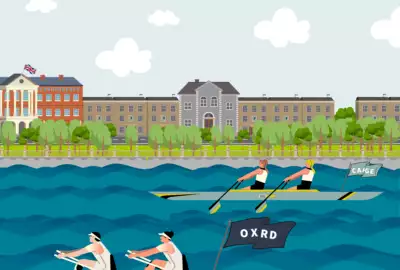
What Are the UCAS Deadlines for 2026 Entry?
Applying to university is one of the biggest milestones in your educational journey. Whether you’re a student planning ahead or a parent supporting your child, understanding the UCAS Deadlines for 2026 entry is crucial to avoid missed opportunities and last-minute stress.
This comprehensive guide explains every stage of the UCAS application process for 2026, from when applications open to final deadlines, plus what to do if you miss them.
What Is UCAS and Why Do Deadlines Matter?
UCAS (Universities and Colleges Admissions Service) is the system through which you apply to universities in the UK. Nearly every undergraduate course goes through UCAS.
Deadlines are extremely important because:
-
Most universities do not consider late applications.
-
Competitive courses (e.g. Medicine, Oxford, Cambridge) close early.
-
Missing deadlines can limit your options to courses with remaining places via Extra or Clearing, which are not guaranteed to align with your goals.
Key UCAS Deadlines for 2026 Entry (At a Glance)
| Date | Event |
|---|---|
| 13 May 2025 | UCAS applications open for 2026 entry - Passed |
| 2 September 2025 | Applications can be submitted to UCAS - Passed |
| 15 October 2025 | Deadline for Oxford, Cambridge, Medicine, Dentistry, Veterinary Medicine/Science - Passed |
| 14 January 2026 | Main UCAS equal consideration deadline |
| 26 February 2026 | UCAS Extra opens |
| 31 March 2026 | Advisory decision deadline |
| 6 May 2026 | Decline by Default (DBD) deadline |
| 13 May 2026 | Reject by Default (RBD) deadline |
| 30 June 2026 | Final submission deadline before Clearing |
| 4 July 2026 | Extra closes |
| 5 July 2026 | Clearing opens |
| 19 October 2026 | Clearing closes |
Let’s break down what each deadline means for you.
2.0 Top
Undergraduate Applications
If you're planning on applying for an undergrad course, the information below can help you with your application procedure:

When do Undergraduate Applications Open?
From 13 May 2025, you can register and begin your application on UCAS Hub. This is when:
- You create your UCAS profile
- Begin your personal statement draft
- Add your GCSE and A-Level subjects and predicted grades
- Start your course and university research
Why is this important?
Starting early gives you ample time to refine your personal statement and ensure your application is strong before submission opens.
When can UCAS Applications be Submitted?
Although you can create your application from May, you cannot submit it until 2 September 2025. From this date onwards:
-
Schools/colleges finalise your academic reference
-
You pay the UCAS fee and officially submit your application for universities to begin consideration.
Need guidance from the very first step? Book a consultation with our UK university experts today.

Deadline for Oxford, Cambridge & Medicine UCAS Applications
If you are applying to:
-
University of Oxford
-
University of Cambridge
-
Medicine, Dentistry, or Veterinary Medicine/Science anywhere in the UK
Your application must have been submitted by 15 October 2025. This means that you should now consider a 2027 entry.
Why is this earlier?
These courses are highly competitive. Early deadlines allow time for additional assessments and interviews.
Applying to Oxbridge or Medicine? Our consultants specialise in guiding students through these competitive applications. Learn more about Ivy Education’s support here.
What is the Equal Consideration Deadline and When Is It?
This is the most important deadline for most students.
-
Submit by 6pm UK time on 14 January 2026 to be guaranteed equal consideration for your chosen courses.
-
Applications submitted after this date are marked as “late” and may only be considered if places remain.
Tip: Universities are not obliged to consider late applications, especially for popular courses.

What is UCAS Extra?
If you used all five choices and do not hold any offers, UCAS Extra gives you a second chance to apply to additional courses, one at a time.
-
Opens 26 February 2026
-
Closes 4 July 2026
You can keep applying to courses in Extra until you receive an offer or it closes.
Worried about receiving no offers? Our team can help you strategise your UCAS choices and create strong applications to reduce this risk. Contact us here.
What is the Advisory Decision Deadline?
This is a UCAS advisory date by which universities are encouraged to have made decisions on applications submitted by the 14 January deadline.
Why is this helpful?
The earlier you hear back, the more time you have to:
-
Attend offer-holder days
-
Make an informed firm/insurance choice
-
Organise accommodation and finances
What is Decline by Default (DBD) and when is it?
If you receive offers from universities, you must reply by a set date (your UCAS Hub will confirm your personal deadline). For most students who received offers by 20 March, your reply deadline is 6 May 2026.
You must choose:
-
Firm choice (your first-choice university)
-
Insurance choice (your backup, usually with lower entry requirements)
-
Decline other offers
What happens if you miss the DBD deadline?
If you do not reply in time:
-
All offers are automatically declined.
-
Your application status changes to “declined” for all choices.
-
You lose those offers permanently.
What can you do if your offers are declined by default?
You are still eligible for:
-
UCAS Extra (until 4 July 2026) if you used all five choices
-
Clearing, which opens 5 July 2026
Avoid this situation by planning your decision strategy early with expert advice. Book your consultation here.
What is Reject by Default?
Universities have a deadline to respond to your application. If you applied by the 14 January equal consideration deadline, they must make a decision by 13 May 2026.
If they do not respond, UCAS changes your application status to “rejected” for that university automatically.
What happens if you’re rejected by default?
-
You lose that choice
-
If you still hold other offers, you can proceed as normal
-
If you have no offers left, you become eligible for UCAS Extra or later Clearing
Tip: Don’t panic! If you’re rejected by default, review your course options and use Extra or Clearing strategically with guidance.
Final Submission Deadline – 30 June 2026
- Applications submitted after 6pm UK time on 30 June 2026 will not be sent to universities automatically.
- Instead, they enter Clearing directly.
Always aim to apply by this date to be considered in the standard admissions process.
UCAS Extra Deadline
UCAS Extra ends on 4 July 2026. After this, you must wait for Clearing to open if you still need a university place.
3.0 Top
Clearing

What Is UCAS Clearing?
UCAS Clearing is a process that allows students who don’t hold any university offers to apply for courses with remaining places. It is often seen as a “last chance” option but is increasingly used strategically by students to find courses that better suit their goals, especially if they exceed their predicted grades or change their preferences after results day.
Who Can Use Clearing?
You can use Clearing if:
- You didn’t receive any offers from your original UCAS applications.
- You declined all your offers (by choice or by missing reply deadlines – Decline by Default).
- You didn’t meet the conditions of your firm or insurance offers (e.g. missed A-Level grades).
- You applied after 30 June 2026 (all applications after this date automatically go into Clearing).
When Does Clearing Open and Close for 2026 Entry?
| Date | Event |
|---|---|
| 5 July 2026 | Clearing opens – you can see available courses and contact universities. |
| 19 October 2026 | Clearing closes – final date to add Clearing choices on UCAS. |
How Does Clearing Work?
- Check your UCAS Hub status.
On results day (or earlier if eligible), if you’re in Clearing, your UCAS status will show ‘You are in Clearing’ or ‘Clearing has started’.
- Search for courses.
Use the UCAS Clearing search tool to find available courses. Universities update vacancies regularly.
-
Contact universities directly.
Call the admissions office, provide your UCAS ID, and discuss your grades and interest. If they verbally offer you a place, it is usually conditional on you adding them as a Clearing choice on UCAS. -
Add your Clearing choice.
Once you have permission from the university, you add that course as your ‘Clearing choice’ on UCAS. They will then officially confirm your place.

What Types of Courses Are Available in Clearing?
Clearing offers:
-
Courses that were under-subscribed
-
Courses at top universities where applicants missed grades
-
New courses or additional places released after results day
Important: Popular and competitive courses (e.g. Medicine, Dentistry, Oxbridge) do not go into Clearing. However, strong Russell Group universities often have places in sciences, humanities, business, and social sciences.
Should You Wait for Clearing?
While Clearing provides great opportunities, it should not replace your main UCAS application strategy. Use it as a backup plan, not your first plan, because:
-
Courses in Clearing are limited and vary by year.
-
Accommodation options may be reduced.
-
You have less time to research and prepare.
4.0 Top
Have the UCAS deadlines for 2027 been released yet?
The UCAS deadline for 2027 will be released by no later than December 2026, according to UCAS.
Based on past data, here is a timeline of what you can expect for each submission date.
| Date | Event |
|---|---|
| May 2026 (TBC) | UCAS applications open for 2027 entry (you can start your application in UCAS Hub) |
| Early September 2026 (TBC) | Completed applications can be submitted to UCAS |
| 15 October 2026 | Deadline for Oxford, Cambridge, and most courses in Medicine, Dentistry, and Veterinary Medicine/Science (18:00 UK time) |
| Mid–January 2027 (TBC) | Main UCAS equal consideration deadline for most undergraduate courses (18:00 UK time) |
| Late February 2027 (TBC) | UCAS Extra opens for eligible applicants (if you used all five choices and hold no offers) |
| Early May 2027 (TBC) | Decline by Default (DBD) – if you received all decisions by 31 March, you must reply by this date or your choices will be declined |
| Mid–May 2027 (TBC) | Reject by Default (RBD) – providers’ decision deadline for applications submitted by the January equal consideration date |
| 30 June 2027 | Final main-cycle submission deadline before Clearing (18:00 UK time). Applications after this go straight into Clearing |
| Early July 2027 (TBC) | UCAS Extra closes |
| Early July 2027 (TBC) | Clearing opens; vacancies appear in UCAS search |
| Late September 2027 (TBC) | Final date to submit 2027 entry applications (18:00 UK time) |
| Mid–October 2027 (TBC) | Last date to add a 2027 entry Clearing choice |
5.0 Top
Key UK University Admissions Milestones
At a glance, here is a comprehensive list of the important stages to applying for a UK University through UCAS. At the bottom, we have provided a FREE downloadable version of the table below:
| Stage | Typical Timeframe | What Happens |
|---|---|---|
| Explore courses & open days | Year 11 – Summer before Year 12 | Research universities, subjects, open days, and extracurricular activities |
| Start your personal statement | Summer before Year 13 | Draft your statement and finalise course/university shortlist |
| UCAS opens | Early September (Year 13) | Begin UCAS applications; confirm choices and test dates |
| Oxbridge / Medicine / Vet deadline | Mid October (Year 13) | Submit early applications; continue admissions test prep |
| General UCAS deadline | End of January (Year 13) | Submit the majority of UCAS applications |
| Interviews & offers | Spring – Summer (Year 13) | Prepare for interviews; receive offers and make firm/insurance choices |

Final Thoughts
Navigating the UCAS application process can feel overwhelming, especially if it’s your first time applying to university or supporting your child through the journey. The key to success is understanding each deadline, its purpose, and how it fits into your timeline.
Start early – Begin researching courses, drafting your personal statement, and understanding entry requirements well before applications open in May 2025.
Don’t miss critical deadlines – Especially the 15 October deadline for Oxbridge, Medicine, Dentistry, and Veterinary courses, and the 14 January 2026 equal consideration deadline for all other courses.
Stay organised with decision deadlines – Decline by Default (DBD) on 6 May 2026 and Reject by Default (RBD) on 13 May 2026 ensure you and universities act on offers efficiently.
Ready to build a strong application plan for 2026? Contact Ivy Education today to begin your journey with expert guidance.
7.0 Top
UCAS Deadlines 2026 FAQs
UCAS (Universities and Colleges Admissions Service) is the organisation that manages applications to undergraduate university courses in the UK. Nearly every UK university application is submitted through UCAS.
You can start your UCAS application for 2026 entry on 13 May 2025, but you cannot submit it until 2 September 2025.
The equal consideration deadline is 14 January 2026 at 6pm UK time. Applications submitted by this date will be considered equally by universities.
The deadline for Oxford, Cambridge, Medicine, Dentistry, and Veterinary Medicine or Science courses is 15 October 2025 at 6pm UK time.
If you miss the 15 October deadline, you cannot apply for Medicine, Dentistry, Veterinary Medicine/Science, or Oxbridge courses for 2026 entry and will need to wait until the next application cycle.
Decline by Default means if you do not respond to your offers by your reply deadline, usually 6 May 2026, UCAS will automatically decline all your offers and you will lose them.
Reject by Default is when universities fail to make a decision on your application by their deadline, usually 13 May 2026, and your application is automatically rejected for that course.
UCAS Extra is a service that opens on 26 February 2026 for students who used all five choices and do not hold any offers, allowing them to apply to additional courses one at a time.
Clearing is the process for students without any offers or who didn’t meet their offer conditions to find available university places. It opens on 5 July 2026 and closes on 19 October 2026.
Yes, if you exceed your predicted grades, you can use Clearing to apply for courses with higher entry requirements, but you should only decline your current offer after securing a new one.
Yes, you can apply independently through UCAS but you will still need an academic reference, which educational consultants like Ivy Education can guide you to organise effectively.
Ivy Education supports students with university choices, personal statements, competitive course preparation, and Extra or Clearing strategies to maximise their chances of securing offers.
Other Articles

Jul 03, 2025
5 Tips for Applying to US Universities

Jun 27, 2025
Oxford vs Cambridge: Which University to Pick?

Jun 06, 2025
How to Get Into Cambridge University

May 30, 2025
What is Oxbridge: A Guide

Oct 31, 2025
Free UK University Admissions Timeline

Oct 24, 2025
Oxford College Selection Guide

Oct 17, 2025
What Happens After A UCAS Submission?

Oct 10, 2025
How to Tackle the LNAT Essay Section

Oct 03, 2025
Supercurriculars to Boost Medicine Applications

Sept 26, 2025
How to Finalise Your US College List in 5 Easy Steps

Sept 19, 2025
What Is the LNAT?

Sept 12, 2025
Oxbridge Interview Preparation Guide

Aug 29, 2025
How to Revise for UCAT

Aug 13, 2025
Oxbridge vs Ivy League: A Comparison Guide
As featured in










Click here to join our community and receive complimentary tailored academic guidance for you and your family.


